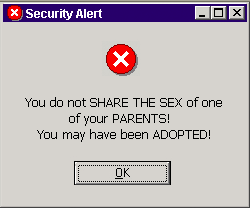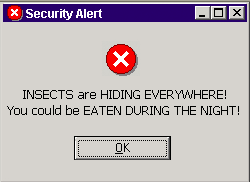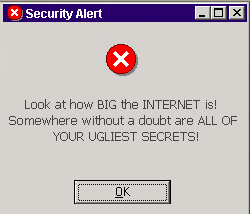Badvertising on the 'Net: Your computer is currently broadcasting an IP address!
You've seen these ads, without a doubt. They pop out of nowhere, looking
quite like a genuine Windows system alert.
Often they flash "WARNING!" or some such, to catch your attention. Then
they proceed with a breathless
message, something like the following: "Your computer is currently broadcasting an IP address! With
this address, someone could begin hacking
your system IMMEDIATELY!" There are several variants, one is shown below:
An example of this unethical advertisement:

Well, rest assured. Your computer is not going to blow up. You probably
know that an IP address is simply a number for
your computer that allows other computers on the Internet to send you
packets of information, using the TCP/IP protocol.
It's only "broadcast" to the machine you're downloading data from, and
the few intermediate machines on the network that are
needed to reach the target machine. By itself, it's not really enough
information for a malicious hacker to perform some exploits on your
system. And without sending out an IP address (either yourself or
through a proxy server) you really can't get
anything off the Internet using TCP/IP - you couldn't Web browse at all!
These ads are designed to look like system errors so they build concern
from the user that his or her system
may be malfunctioning or is unsafe, and then they could be cheated into
buying the software "solutions" the ad is selling.
Often this software is spyware and therefore a security compromise
itself.
This kind of "badvertising" would never be allowed in a print media. If
you see an advertisement in the newspaper
made up to look like a real, objective news report, it always has
"ADVERTISEMENT" printed somewhere on it in big
bold letters. That's not only editorial policy - in many places, the law
requires it. But on the Internet, unethical
companies think nothing of designing popup ads to look like real system
errors, to push their software onto the tricked
victims. It really shouldn't be allowed, and
the company that created these ads is currently facing a lawsuit.
But as long as we can use deception and paranoia to sell things, here
are a few other warnings I feel advertisers should
consider using in their ads, in roughly the order of sensationalism:
Concept #1 |

|
 |
Concept #2 |
Concept #3 |

|
 |
Concept #4 |
Concept #5 |

|
 |
Concept #6 |
Concept #7 |

|
 |
Concept #8 |
Concept #9 |

|

| Concept #10 |
...and of course, with all of these ideas in hand, now the question we have to ask is, what wonderful products can those pop-up ads appropriately advertise?